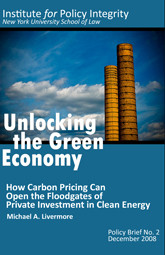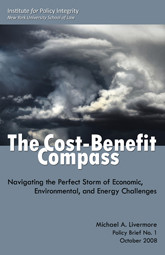-
_110_170_90.jpg)
Regulatory Change and Optimal Transition Relief
Grandfathering has become a common practice in regulating industries like coal power generation. But it is not clear that phasing out polluting plants is beneficial. The costs of retrofitting existing plants to comply with new standard can be higher than the compliance costs for a new plant. Since the costs of shifting to new technology must be borne at some point, (since granfathering can’t be indefinite) it might be best not to grandfather at all so that society can benefit from lower pollution levels earlier. That’s just one of the arguments examined in this working paper.
-
Mayor Bloomberg Signs Heating Oil Bill into Law
This afternoon, Policy Integrity legal fellow, Jason Schwartz spoke at the bill signing ceremony for Introduction 194|Text|&Search=194, a New York City Council act that will reduce air pollution.
-
Policy Integrity Testifies at NY City Council Hearing on Clean Heating Oil
Policy Integrity legal fellow, Jason Schwartz, testified this afternoon at a hearing on a bill that would restrict the use of the dirtiest fuels used to heat some New York City apartments.
-
Research in support of heating oil regulations
For the last year, New York City has been working to develop potential regulation of the dirtiest heating oils used in residential and commercial boilers. Policy Integrity has been in close contact with city officials and interested advocacy groups as the rule is being developed to help quantify the potential health benefits and shape a rational regulatory response.
-
NY State Energy Plan released
New York State released its final Energy Plan today. Few changes were made from the revised draft version from the draft version. Policy Integrity had proposed distributing tradable energy vouchers to businesses instead of pure electricity subsidies in order to incentivize them to reduce their electricity usage—at no extra cost to taxpayers.
-
Expanded comments on the New York State Energy Plan
Policy Integrity expanded on our initial comments on the New York State Energy Plan. In this version, more detail is offered on how the state could build efficiency incentives into its economic development programs.
-
Comments on New York state electricity subsidies
New York State subsidizes the electricity bills for some companies as a way of encouraging them to keep their business here.
-

Unlocking the Green Economy
How Carbon Pricing Can Open the Floodgates of Private Investment in Clean Energy
Unlocking the Green Economy: How Carbon Pricing Can Open the Floodgates of Private Investment in Clean Energy calls for the Obama Administration to implement carbon pricing as a necessary step to transition to a green U.S. economy.
-

The Cost-Benefit Compass
Navigating the Perfect Storm of Economic, Environmental, and Energy Challenges
The Cost-Benefit Compass: Navigating the Perfect Storm of Economic, Environmental, and Energy Challenges discusses how the next administration can use cost-benefit analysis to address the three great interrelated challenges facing the country.
-
Statement of Principles for HEAP energy relief efforts
Economists know that when the cost of basic goods like energy increase, quality of life of decreases most for people with lower incomes. This is an important issue that government agencies should consider when estimating the effects of regulations.
Viewing recent projects in Electricity
